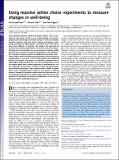Using massive online choice experiments to measure changes in well-being
Author(s)
Brynjolfsson, Erik; Collis, Avinash; Eggers, Felix
DownloadPublished version (588.4Kb)
Publisher Policy
Publisher Policy
Article is made available in accordance with the publisher's policy and may be subject to US copyright law. Please refer to the publisher's site for terms of use.
Terms of use
Metadata
Show full item recordAbstract
Gross domestic product (GDP) and derived metrics such as productivity have been central to our understanding of economic progress and well-being. In principle, changes in consumer surplus provide a superior, and more direct, measure of changes in wellbeing, especially for digital goods. In practice, these alternatives have been difficult to quantify. We explore the potential of massive online choice experiments to measure consumer surplus. We illustrate this technique via several empirical examples which quantify the valuations of popular digital goods and categories. Our examples include incentive-compatible discrete-choice experiments where online and laboratory participants receive monetary compensation if and only if they forgo goods for predefined periods. For example, the median user needed a compensation of about $48 to forgo Facebook for 1 mo. Our overall analyses reveal that digital goods have created large gains in well-being that are not reflected in conventional measures of GDP and productivity. By periodically querying a large, representative sample of goods and services, including those which are not priced in existing markets, changes in consumer surplus and other new measures of well-being derived from these online choice experiments have the potential for providing cost-effective supplements to the existing national income and product accounts.
Date issued
2019-03-26Department
Sloan School of ManagementJournal
Proceedings of the National Academy of Sciences of the United States of America
Publisher
Proceedings of the National Academy of Sciences
Citation
Brynjolfsson, Erik, Avinash Collis and Felix Eggers. "Using massive online choice experiments to measure changes in well-being." Proceedings of the National Academy of Sciences of the United States of America 116 (2019): 7250-7255 © 2019 The Author(s)
Version: Final published version
ISSN
0027-8424
1091-6490
Keywords
Multidisciplinary